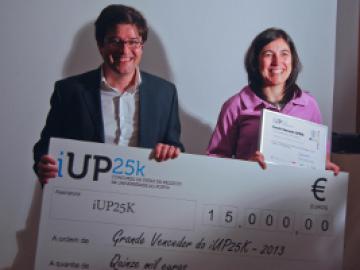News

The iUP25k - Business Ideas Competition of University of Porto, regarded as one of the largest initiatives of national importance in the area of entrepreneurship, distinguishes Helder Crespo, professor in the Department of Physics and Astronomy of the Faculty of Science, University of Porto (FCUP) and Rosa María Romero Muñiz, Ph.D. and researcher at the FCUP IFIMUP with the first prize of 15,000 euros in the 2013 edition of IUP25K.
Helder Crespo and Rosa María Romero Muñiz are responsible for the design winner-Sphere Ultrafast Photonics and will soon launch on the market the company Sphere Ultrafast Photonics, whose expertise focuses on high-tech production.
According to Helder Crespo, leader of the project, the work is related to a new method and system for measurement and control of ultra-short (the fastest ever produced and measured by mankind) laser pulses, which have very important applications in areas as various as medical and high processing precision materials. The project is being developed under the scientific collaboration between FCUP and the University of Lund, Sweden. The project team and collaboration is composed by Rosa María Muñiz Romero, Anne L'Huillier, Helder Crespo and Miguel Miranda. The PhD work of Miguel Miranda was conducted in co-supervision with the University of Lund and the University of Porto, and its a very important contribution to this project.
Tell me a little about your work?
Our research is directly linked to development, construction and application of new light sources, ultra-fast lasers. We produce lasers that are capable of producing built light pulses with duration of a few femtoseconds (fs = 1 0,000.000.000.000.001 seconds), which are the basis of the fastest ever measured and produced phenomena. In our laboratory we are using the impulses produced to study ultrafast processes in various materials such as magnetic materials, and also to generate ultra-short pulses of X-rays. This is important not only from the point of view of fundamental physics but also for practical applications that make use of the materials studied and generated X-rays.
In addition to our work, the ultra-short lasers nowadays have very important applications in areas such as diagnosis and ocular therapy, nonlinear microscopy (which allows for example to study in vivo brain function) and the processing of high precision materials. To capitalize on the unique characteristics of ultrafast lasers is necessary to measure them and control them with great precision, which is a very difficult task in itself given the extremely short pulse duration. Traditional methods of measurement are complex and usually fail when we try to apply them to very short pulses. We recently invented a new method, in collaboration with the University of Lund in Sweden, that enables simultaneous control and measure of ultrafast lasers. This method, called d-scan is totally new, simpler, easier to use and capable of measuring pulses shorter than traditional methods. The d-scan is the basis of the business idea with which the Sphere Ultrafast Photonics now won the first prize of iUP25k.
If you were asked to describe yourself using only 5 words, which would you choose?
Scientist, entrepreneur, and surrounded by a fantastic team.
"FCUP: 101 years. Commitment with the Future.". What message would you like to send?
I think our commitment is to the present. It is now. For this reason it is that I am responding at 9:40 at night. In a politically correct version would say the following: universities, from their research, are core centres to create new ideas and new technologies. Able to transform this intellectual and technical assets into a successful product and take it to the community is a great challenge and the aim of Sphere Ultrafast Photonics.
In http://sigarra.up.pt/fcup/pt/noticias_geral.ver_noticia?P_NR=4390